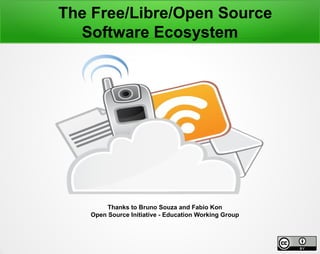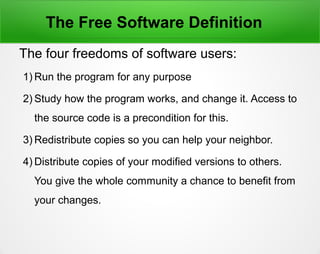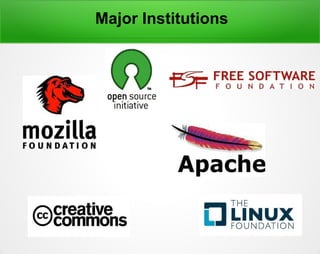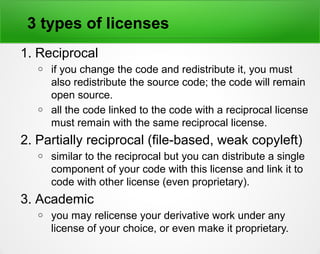Open Source Introduction
- 1. The Free/Libre/Open Source Software Ecosystem Thanks to Bruno Souza and Fabio Kon Open Source Initiative - Education Working Group
- 2. The Free Software Definition The four freedoms of software users: 1) Run the program for any purpose 2) Study how the program works, and change it. Access to the source code is a precondition for this. 3) Redistribute copies so you can help your neighbor. 4) Distribute copies of your modified versions to others. You give the whole community a chance to benefit from your changes.
- 3. Modern times â—Ź 1991: Linus Torvalds makes his OS available â—Ź 1992: GNU/Linux is born â—Ź 1995: MySQL â—Ź 1998: Netscape opens its Mozilla browser â—Ź 1998: Open Source Initiative (OSI) is founded â—Ź 1999: Apache Foundation formed â—Ź 2000: Sun opens StarOffice, creating OpenOffice.org â—Ź 2001: Wikipedia is created â—Ź 2002: Creative Commons â—Ź 2003: Motorola releases first cell phone with Linux â—Ź 2004: First version of Ubuntu
- 6. Open Source Definition An open source license must comply with: 1. Free Redistribution 2. Source Code 3. Derived Works 4. Integrity of the Author's Source Code 5. No Discrimination Against Persons or Groups 11.No Discrimination Against Fields of Endeavor 12.Distribution of License 13.License Must Not Be Specific to a Product 14.License Must Not Restrict Other Software 15.License Must Be Technology-Neutral
- 7. 3 types of licenses 1. Reciprocal o if you change the code and redistribute it, you must also redistribute the source code; the code will remain open source. o all the code linked to the code with a reciprocal license must remain with the same reciprocal license. 2. Partially reciprocal (file-based, weak copyleft) o similar to the reciprocal but you can distribute a single component of your code with this license and link it to code with other license (even proprietary). 3. Academic o you may relicense your derivative work under any license of your choice, or even make it proprietary.
- 8. • SourceForge: 316,624 projects • GitHub: 3,012,331 repositories, 1,067,856 users • Java.net: 2,132 projects, 716,303 users • Apache: 100+ projects, 2000+ committers • RubyForge: 9,281 projects, 92,701 users • Savannah: 3,391 projects, 53,966 users • Launchpad: 24,997 projects, 1,796,156 translations • Codeplex: 25,064 projects Many, many developers!
- 9. Small, practical things you can do... • Use open source software o you can't learn something you don't use! • Once you find a problem, report it o this helps you learn how the project works • Join the mailing list and answer questions o teaching others helps you learn more than anything • Promote open source ideas in other areas – social activism – privacy protection – knowledge sharing
- 10. Small, practical things you can do... • Use open source software o you can't learn something you don't use! • Once you find a problem, report it o this helps you learn how the project works • Join the mailing list and answer questions o teaching others helps you learn more than anything • Promote open source ideas in other areas – social activism – privacy protection – knowledge sharing
Editor's Notes
- This presentation is distributed under the Creative Commons, Attribution license - http://creativecommons.org/licenses/by/3.0/ Please, modify it to your liking, and present it on your user group meeting, your company, your school or university. Help spread the ideas of open source.
- Free Software Foundation (FSF) Open Source Initiative (OSI) Sofware Freedom Law Center Creative Commons Electronic Frontier Foundation FLOSS Competence Centers Network www.flosscc.org
- some of the most important repositories of floss code and some of their metrics http://sourceforge.net/ 316,624 projects Dailly activity: 3,649,869 Downloads 5,807 Code Commits 2,763 Forum posts 904 bugs tracked (october/2011) http://codehaus.org/ https://github.com/ 1,067,856 people hosting over 3,012,331 git repositories list of projects: https://github.com/repositories http://apache.org The ASF is made up of nearly 100 top level projects that cover a wide range of technologies. Chances are if you are looking for a rewarding experience in Open Source, you are going to find it here. list of projects: http://projects.apache.org/indexes/quick.html http://www.java.net/ Java focused repository List of projects: http://www.java.net/projects/community http://rubyforge.org/ Ruby and Rails focused repository Hosted Projects: 9,281 Registered Users: 92,701 http://code.google.com/hosting/ http://savannah.gnu.org/ 53966 registered users 3391 hosted projects Welcome to Savannah, the software forge for people committed to free software We host free projects that run on free operating systems and without any proprietary software dependencies. Our service runs with 100% free software, including itself. http://launchpad.net Ubuntu-focused repository 24,997 projects, 870,990 bugs, 452,314 branches, 1,796,156 translations, 173,804 answers, 38,843 blueprints, and counting... http://www.codeplex.com/ Windows focused repository 25064 projects










